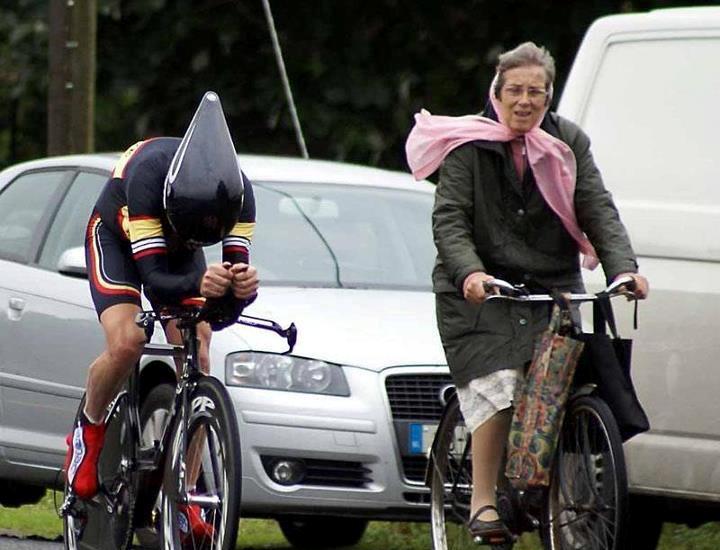It wasn’t that many years ago that we still generally saw the term “cyclist” everywhere in public conversations about biking, leading to all the various negative connotations that can conjure. While it’s still not perfect (mainstream media: I’m looking at you…), it is heartening to see the number of official agencies that now refer to “people on bikes” and other more human-sounding terms. This post, originally from Jan 2013, sets out the arguments for this:
Robert F’s recent post was a very enjoyable read. I was interested in his statement that “I am a cyclist. To define more accurately, I am not a competitive cyclist, extreme cyclist or even much of a recreational cyclist nowadays. Just a cyclist.” You see, as far as I’m concerned, I’m NOT a cyclist. But I do CYCLE…
Is this just playing with semantics? Well it depends on whether if affects how you are perceived.
A couple of months ago, The Press featured some minor column articles on page 3 about road fatalities around the country. I was struck by the key differences between them, and I quote (my emphasis added):
1) “ROAD TOLL RISES: Two people were killed in separated crashes yesterday. One person was killed and one person was injured after two cars collided near Katikati… etc”
2) “CYCLIST DIES: An investigation has opened into the death of an elderly West Coast cyclist. Police said [name] of Greymouth died shortly before noon on Sunday after apparently falling from his bike… etc”
This language pattern has shown up before when reporting crashes involving people walking or cycling; apparently if you are not in a car then you are not a “person”, you are defined by the mode you were travelling by when you were injured/killed.
This might seem like a pedantic point but it has two important follow-up effects:
- Particularly for cycling, there is already enough angst with the general public viewing “cyclists” as different from “the rest of us” (i.e. not just “people” who happen to be cycling at the time) and thus able to be the target of all sorts of abuse (just check out the online comments sometime when a cycling-related article appears, whether good or bad). Mainstream media is very important in working to change this perception.

John Key: well he’s on a bike so he must be a cyclist. But then again, he isn’t wearing lycra… - It fails to dignify the deceased/injured as a person who is no doubt loved by a lot of other people and known to them as many things (e.g. father, friend, brother, etc) and not just as a “cyclist”.
It may take slightly longer to write or say, but it would be preferable to be consistent and refer to “person driving”, “person walking”, “person cycling” (you could even be gender-specific if you wish, e.g. “man driving”).
I raised this issue with The Press to see whether their editorial policy has considered this. To their credit I received this reply:
“Sorry, but you ask something that we cannot do. We need to present news as accurately and as concisely as possible. ”Person cycling” for ”cyclist” breaches those requirements. It is harder to avoid “people” in reports of car crashes because we often do not know whether they were passengers or the driver.”
Now I have some sympathy with the need for brevity, and I can see that it may be difficult to say that a car occupant was driving. However their argument somewhat loses its weight, given that the final line of the cycling article above only contained one word – plenty of room to say “man cycling” instead…
As we look to re-develop Christchurch into a city where virtually anyone could choose to cycle safely and easily, it’s important that we don’t constrain ourselves (or introduce unnecessary tensions) by only thinking we are providing a cycle-friendly city for “cyclists”….

Note: If you want to look at this issue further, you may be interested in my 2007 conference paper “Are you a Cyclist or do you Cycle? The Language of Promoting Cycling”
Are YOU a “cyclist”? Or are you just a person who likes to cycle?

Thanks for posting this, I am sure it is not a coincidence. I am outraged at the comments of a Police spokes person following a critically injured cyclist at the intersection of Selwyn and Somerfield street two days ago. Reportedly, the driver had gone through a stop sign and the cyclist was in a cycle lane and had multiple lights. The first comment from the Police was to remind all cyclists to have lights that make them more visible to drivers. Words do matter. Any person injured or killed on the road is a person. The fact that you drive a car should not mean that you have less responsibility in preventing accidents. Big fail.
ditto Cyclomaniac – that article, the language used in it and the comments from Police got my blood boiling. I noticed there were a couple of letters to the editor in The Press a day or two afterwards expressing similar sentiments.